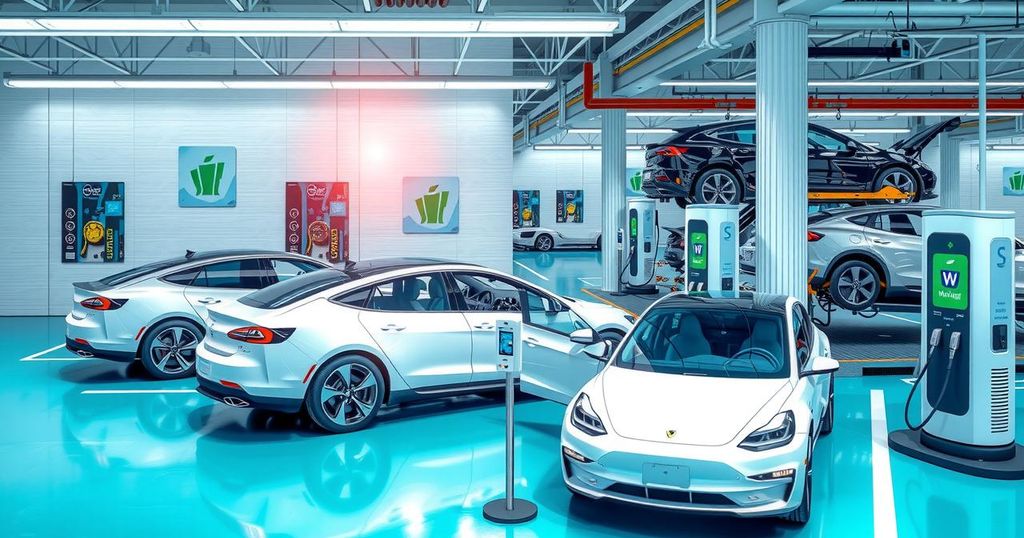Cars
ASIA, AUDI, AUDI FAW NEV CO, AUDI FAW NEV CO., LTD, AUTOMOTIVE INDUSTRY, BMW, CHANGCHUN, CHINA, EUROPE, EXPORT, FOREIGN INVESTMENT, GAO YUNING, GERMANY, HELMUT STETTNER, HUAWEI, INDUSTRY, INTERNATIONAL TRADE, MEGAFACTORY, MINISTRY OF COMMERCE, NORTH AMERICA, ROBOTICS, SCHOOL OF PUBLIC POLICY AND MANAGEMENT, SHANGHAI, TESLA, TSINGHUA UNIVERSITY, UNITED STATES
Marisol Gonzalez
0 Comments
Foreign Auto Brands Harness Expanding Opportunities in China’s NEV Sector
Foreign auto brands are capitalizing on opportunities in China’s new energy vehicle (NEV) sector through increased investments and tailored strategies. Partnerships, such as BMW’s collaboration with Huawei and Volkswagen’s work with FAW, illustrate this trend. The booming NEV market, supported by favorable government policies and consumer openness to new technology, is set to sustain growth for years to come.
Foreign auto brands are actively pursuing growth opportunities within China’s burgeoning new energy vehicle (NEV) sector by increasing investments and expanding their market presence. As the global automotive industry transitions from internal combustion engines to NEVs, both China and Germany benefit from this evolving landscape, as highlighted by Helmut Stettner, CEO of Audi FAW NEV Co., Ltd. Stettner noted that despite challenges, the premium market in China presents significant growth potential for Audi, indicating a strong commitment to this market shift.
BMW has entered a partnership with Huawei to create an in-car digital ecosystem tailored specifically for the Chinese market, demonstrating strategic collaboration in the sector. Furthermore, Tesla’s Megafactory in Shanghai recently exported its first batch of Megapack energy-storage batteries, marking its expansion outside the United States. According to Gao Yuning, deputy dean of the School of Public Policy and Management at Tsinghua University, the continuous improvement of China’s NEV market, characterized by a favorable business environment and efficient supply chains, is a major driving force for foreign investments in the region.
In 2024, production and sales of NEVs in China surpassed 12 million units, reinforcing its global leadership in this area. The country produces roughly 70 percent of the world’s battery materials and 60 percent of power batteries, establishing a strong industrial chain. The Chinese government has fostered a conducive environment for NEV development through policies including purchase subsidies and enhanced charging infrastructure. Notably, over 60 percent of vehicles purchased under the automobile replacement policy in 2024 were NEVs, with foreign brands comprising more than 35 percent of these purchases.
The openness of Chinese consumers to new technologies, particularly in intelligent networking, has catalyzed new business opportunities for foreign automakers. For instance, a Tesla salesperson noted a shift in customer priorities from cruising range and cost performance to features like smart cockpits and automatic parking. Consequently, foreign car companies are tailoring new models to the preferences of the Chinese market, integrating advancements in smart driving and green solutions.
Volkswagen Group, through a strategic partnership with China’s First Automobile Works (FAW), announced plans to introduce 11 new models specifically designed for Chinese consumers by 2026. Ralf Brandstaetter, chairman and CEO of Volkswagen Group China, emphasized the importance of their collaboration with FAW, stating that it aligns with their “In China, for China” strategy, which focuses on expanding their NEV offerings to meet evolving market demands. Gao Yuning further noted that the stable growth of China’s economy and its commitment to high-level opening-up serve as strong incentives for foreign investment in the country.
In conclusion, foreign auto brands are making significant strides in China’s new energy vehicle market by expanding their investments and adapting their strategies to meet local consumer demands. With strong partnerships, innovative technologies, and favorable government policies, these companies are poised to capitalize on the growth potential in China’s NEV sector, which remains a global leader.
Original Source: www.shine.cn




Post Comment